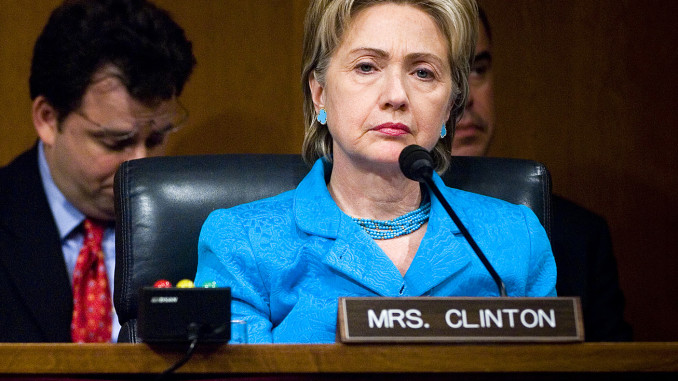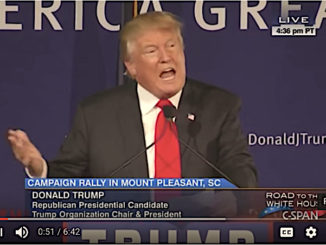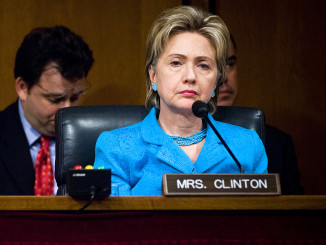
In 2007, Hillary Clinton criticized the administration of President George W. Bush for its “secret” email accounts.
In the summer of 2014, the House Select Committee on Benghazi “realized there was a problem,” in that the State Department did not provide any emails by Hillary Clinton.
Trying to investigate the attack in Libya, where four Americans were killed, the Committee needed to review the emails of the former Secretary of State. When she ceased to be Secretary of State (in February 2013), Hillary Clinton was required to turn in all official records of her work, like other government employees, but she did not.
Section 1924 of Title 18 of the US Code states that “knowingly” removing or housing classified documents at an “unauthorized location” is subject to a fine or a prison sentence.
The Federal Records Act requires all agencies to retain all official communications, including all work-related emails, and stipulates that government employees cannot destroy or remove relevant records.
The Select Committee discovered that during her time as Secretary of State, Hillary Clinton used her own private email server instead of a secure account issued by the government. Her aides too used personal accounts, and contrary to Federal law, did not preserve the emails sent to or received from Hillary Clinton.
On March 4, 2015, the Select Committee issued a subpoena to Hillary Clinton, ordering her to turn over any emails or documents in her possession pertaining to Libya. Her lawyer, David Kendall, responded to the subpoena on March 27.
Later, on July 7, CNN’s Brianna Keilar interviewed Hillary Clinton and asked about the subpoena (at 8:50). Hillary Clinton replied with a lie: “I’ve never had a subpoena.”
But back to March 10, 2015. At a news conference at the Security Council of the United Nations, Hillary Clinton admitted that she had used a personal email account and server. She said that her decision “was allowed by the State Department.” She said:
“I did not email any classified material to anyone on my email; there is no classified material.”
In addition, she said that, “The server, um, will remain, uh, private.”
The following day, the Associated Press filed a lawsuit against the State Department for failing to fulfill multiple Freedom of Information Act requests over the past five years, requests about Hillary Clinton’s emails as Secretary of State.
On July 20, 2015, U.S. District Judge Richard J. Leon complained that for years the State Department was “dragging their feet,” whereas “even the least ambitious bureaucrat” could process the request faster. On August 7, Judge Leon set a strict schedule ordering the State Department give the requested documents to the Associated Press.
Meanwhile, Hillary Clinton finally turned over 30,000 emails to the State Department, in 55,000 printed pages. She admitted that there had been 32,000 more, but that she deleted them, saying that they were “personal.”
On June 29, 2015 the Inspector General of the State Department, Steve A. Linick wrote that an initial review Hillary Clinton’s emails found “hundreds of potentially classified emails.” On July 17, Linick and the Inspector General of the Intelligence Community, I. Charles McCullough III, sent a memo to the Under Secretary of State for Management, confirming that some of emails contained classified information. (McCullough was appointed by President Obama in 2011.)
Some of the classified information had originated from U.S. intelligence agencies, including the Central Intelligence Agency and the National Security Agency. The Inspectors stated that the information was classified when sent, remained classified, and “never should have been transmitted via an unclassified personal system.”
Some of Hillary Clintons emails contained “Top Secret/Sensitive Compartmented Information.”
When the Inspector Generals found that Hillary Clinton’s emails contained classified information, they alerted the FBI’s counterintelligence office.
Consequently, Hillary Clinton finally agreed to turn over her server to the State Department and the FBI.
The group Judicial Watch also had filed multiple Freedom of Information Act lawsuits requesting Hillary Clinton’s records. State Department officials refused such requests.
On August 20, 2015, the U.S. District Judge Emmet G. Sullivan presided over another hearing to determine whether the State Department was sufficiently forthcoming about Hillary Clinton’s emails.
Judge Sullivan noted that Hillary Clinton failed to follow government policies: “We wouldn’t be here today if this employee had followed government policy.” Judge Sullivan was appointed by President Bill Clinton. Judge Sullivan added: “There was a violation of government policy.” He repeatedly referred to the State Department’s obligation to preserve records under the Federal Records Act of 1950.
In a status report to the judge, State Department officials stated: “The Department does not believe that a reasonable search for records responsive to plaintiff’s FOIA request requires a search of former Secretary Clinton’s server,” in a status report to the judge.
Judge Sullivan rejected that claim. He wrote:
“The State Department is hereby ordered to request that the Federal Bureau of Investigation (FBI) inform it about any information recovered from Mrs. Clinton’s server and the related thumb drive that is: (a) potentially relevant to the FOIA request at issue in this case; and (b) not already in the State Department’s possession.”
For months, the State Department has very slowly released selections of Hillary Clinton’s emails. Presently, more than 1,300 emails to and from Hillary Clinton have been categorized as classified.
The State Department is in a ridiculous and embarrassing situation. Apparently they want to confirm that Hillary Clinton’s emails were not classified originally. Yet the contents of the emails are so sensitive that they could not just be released all at once. Instead, the State Department slowly studies them, censors them, and marks them “retroactively” as classified, so that they cannot be seen.
But it’s too late. It’s painfully clear that Hillary Clinton chose to avoid government regulations by removing and deleting work emails. For example, Hillary Clinton did not turn over emails from her that were independently turned over by Sidney Blumenthal. Worse, Hillary Clinton held classified information outside of the secure, government servers, during and after her tenure as Secretary of State.
On January 14, 2016, the Inspector General of the Intelligence Community, McCullough, said in a letter to the chairmen of the Senate committees on Intelligence and Foreign Relations that he received sworn declarations about, additional, “several dozen emails containing classified information determined by the IC element to be at the CONFIDENTIAL, SECRET and TOP SECRET/SAP information” in Hillary Clinton’s emails.
The TOP SECRET/Special Access Program information, is “beyond TOP SECRET,” it is information so sensitive that the Inspector General had to receive special clearance to even see it. Mishandling such information is a violation of U.S. Code 18 Section 793, under the Espionage Act.
As Secretary of State, Hillary Clinton warned her underlings to “avoid conducting official Department business from your personal e-mail accounts.” But she acted as if the rules did not apply to her. As she told CNN on July 7, 2015: “There was no law, there was no regulation, there was nothing that did not give me the full authority to decide how I was going to communicate.”




Leave a Reply